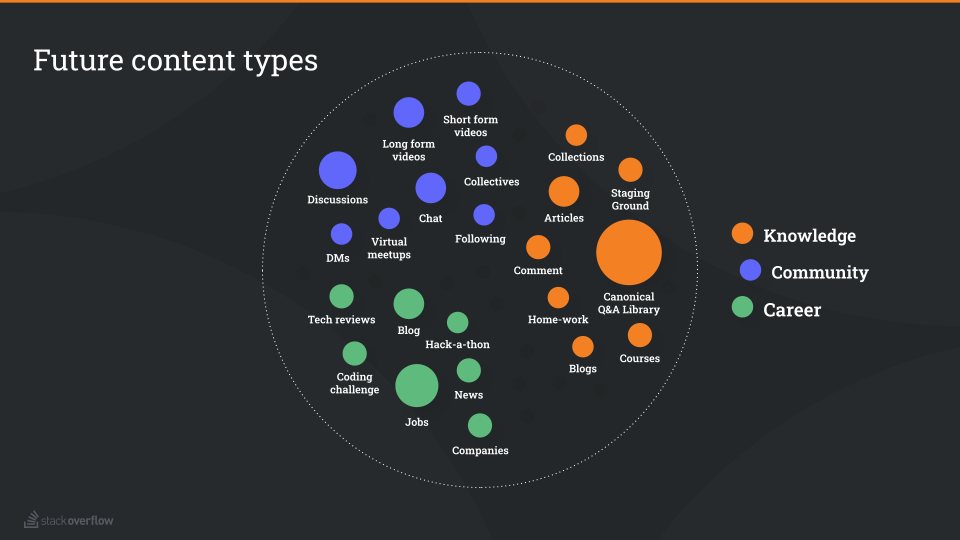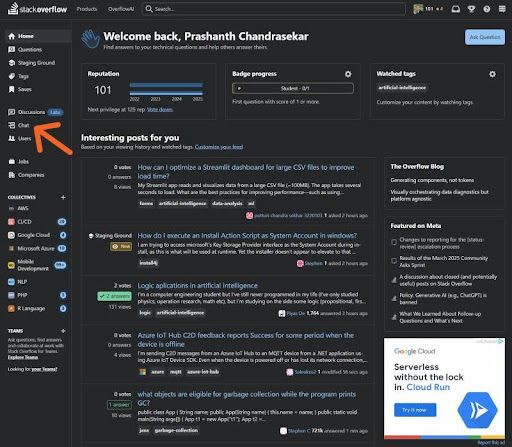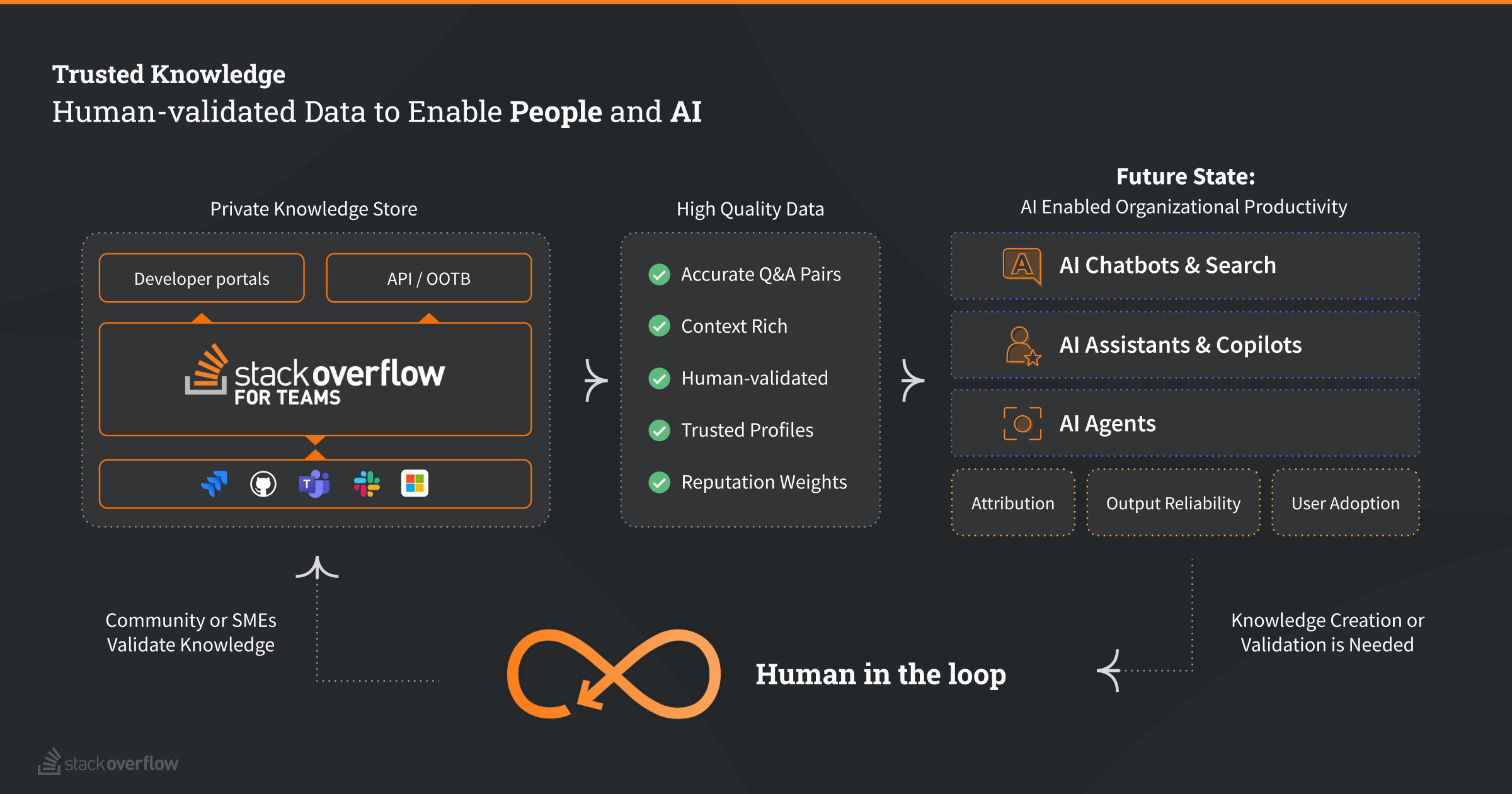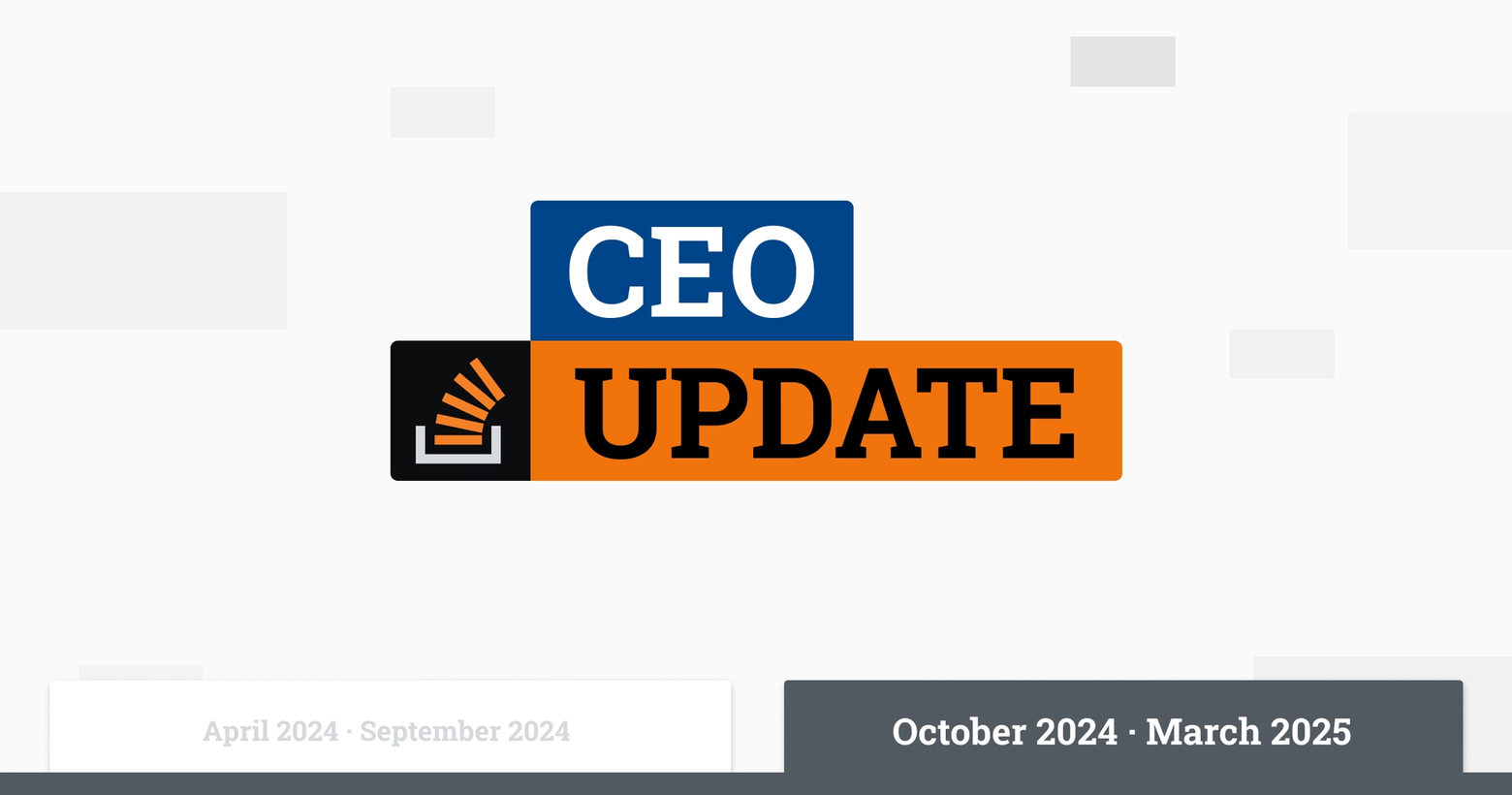Spring is known as a time of renewal and reflection. Here at Stack Overflow, we spent the final two quarters of our fiscal year, which ended this past March, building on the momentum of our flagship partnerships, but also charting a course for how Stack Overflow can continue to serve developers for many years to come. We’ve seen advancements in the AI space arrive at a breakneck pace, with the rise of agentic AI use cases changing the conversation and the rapid ascent of open-source LLM models such as DeepSeek early this year representing a tectonic shift and democratizing AI access for startups competing in the application space.
Keeping our community at the center is the heart of our mission. Technologists, especially those just embarking on their careers, believe in the same values of community and collaboration when it comes to technological progress. Our latest Stack Overflow Knows survey, released in April, explores our community’s thoughts on open-source versus proprietary technologies. Our users expressed a preference towards open-source tech and AI, and an overwhelming majority of respondents (86%) believe that open-source AI serves the public’s best interest. At a time when the tide of public opinion favors community-based models and open-source technology, platforms like Stack Overflow have the opportunity to act as a bulwark against misinformation and the pervasive lack of trust in the content generated by GenAI tools.
Meaningful evolution across our products requires both intentional decisions and bold vision informed by experimentation and feedback. As we envision what the ideal future version of Stack Overflow looks like, we’re committed to engaging with our community to shape how we iterate and expand our product offerings for both our community users and enterprise customers. Our north star is to meet today’s developers where they are, but also blaze a trail to where the next generation will be.
Experimentation to foster community engagement
First and foremost, we pride ourselves on always centering our community and coming to the table to listen to the perspectives of our users. To that end, we held our very first public, live Community Q&A session with myself, our Chief Product and Technology Officer Jody Bailey, and our SVP of Community Philippe Beaudette. We wanted to carve out dedicated time to share our vision for how we plan to update and add features on our public platform, but also explore modes of engagement beyond our traditional Q&A format. We shared that our vision for the new Stack Overflow exists as a “third screen” for technologists, with pillars dedicated to Knowledge, Community, and Careers that may include various types of content beyond Q&A including chat, articles, blogs, coding challenges, videos, educational resources, and more. To truly grow, cultivate, and encourage the creation of new and relevant knowledge, we have to expand the ways to contribute to the web’s knowledge sources.

One such example of our community offerings evolving through direct feedback and experimentation from our users is Question Assistant. Last year our team released Staging Ground, a space on our public platform to help new question-askers to receive guidance and feedback on their drafts from experienced users of the site before publicly posting. Through our partnership with Google, we developed an AI feature powered by Gemini that evaluates question drafts and provides real-time suggestions for improvements before new users submit them in Staging Ground for human review. After a series of these machine learning powered experiments, our team saw an increase in the success rates for posted questions. Given the substantive success rate and consistency of our team’s findings, we graduated the Question Assistant feature to general availability in March of this year.
Additionally, in the spirit of fostering even more connections between our community members in an increasingly AI-driven world, last month we resurfaced and enabled the chat feature on all 180 Stack Overflow and Stack Exchanges sites. Imagine being able to directly engage with the world’s foremost experts on Python, Rust, machine learning, LLMs, or whatever new technology or programming language you might be learning. Our vision is that Chat on Stack Overflow will serve as an immediate avenue for engagement beyond our typical Q&A format. Chat has always existed on our platform but was historically leveraged mostly by our power users and not prominently featured on the site. However, after our Community AMA in late February, our team pushed forward a proposal to reintroduce chat in consultation with our Meta Stack Exchange in early March, with our latest version unveiled just mere weeks later. Staying agile in order to quickly experiment, iterate on user feedback, and then make changes to see what works best for our community is our modus operandi moving forward.

Finally, we also took the opportunity during our AMA to answer as many of our users’ questions as possible. I personally found the experience of interacting with many of you and hearing your thoughts and suggestions very rewarding and informative. We are excited by the journey we are taking together and look forward to sharing updates and continuing the conversation with our community users in the months ahead—stay tuned!
Landmark partnerships to serve developers
One of the other pillars of Stack Overflow’s evolution remains our growing ecosystem of partners who share in our vision of building the future of technology by serving developers and practicing socially responsible AI. Last spring, we announced our first two flagship Knowledge Solutions partnerships with Google Cloud and OpenAI. Both bring generative AI to millions of developers with Gemini for Google Cloud providing answers via our Knowledge Solutions offering, and OpenAI delivering high-quality technical content to strengthen the accuracy and quality of the world’s most popular LLMs. Building on this momentum, we’ve continued the rolling thunder of strategic partnerships late last year and into 2025, announcing our latest with GitHub, Microsoft 365, Moveworks, and more of the world’s largest tech companies.
In the fall of 2024, we announced Stack Overflow’s own GitHub Copilot extension, which we previewed last summer during my keynote at WeAreDevelopers. The Stack Overflow extension brings together the world’s leading knowledge platform for highly-technical content and the world’s most widely adopted AI developer tool to assist developers in finding answers to their most complex coding challenges.
The Stack Overflow Connector for Microsoft Graph, initially announced at Microsoft Ignite 2024, is similarly aimed at ensuring developers find trusted solutions to their problems without context switching and maximize their productivity. The Stack Overflow Connector lets users ask their technical questions directly in Microsoft 365 Copilot and receive a summarized response based on Q&A content from their Stack Overflow for Teams instance.
Finally, we unveiled our strategic partnership with Moveworks, which unlocks an integration that brings an installable Stack Overflow agent to Moveworks’ AI Agent Marketplace, enabling joint customers to rapidly empower their employees to find information and automate tasks. With AI agents quickly rising to drive innovation across enterprises, Stack Overflow’s more than 16 years of trusted, accurate data provides a solid foundation for technologists to turn their organizational knowledge into actionable insights.
All of our strategic partnerships are aimed at democratizing access to knowledge in all of the spaces that developers are and within the tools they use regularly. By making Stack Overflow’s over 16 years of trusted data from our public platform available in addition to the knowledge captured within private enterprises via our market-leading knowledge sharing platform Stack Overflow for Teams, developers can seamlessly access the information they need without switching out of their workflow, unlock productivity and collaboration gains, and learn and grow in their careers.
Rewriting the script for the future of knowledge communities
With the many dynamics of AI and open-source technology reshaping the original model of the internet, those who contribute and create content are renegotiating the terms of the implicit agreement with those who use their content. At Stack Overflow we believe we have a pioneering role to play in shifting the conversation around the importance of attribution to our larger knowledge communities and trusted sources of data to secure a future with sustainable technological progress.
Each of the partnerships we have forged over the last year are steps towards our vision of Knowledge as a Service, our approach to addressing the new set of challenges that come with the rise of GenAI and the ensuing shifts in our information landscape. Large language models run the risk of exhausting quality data to train on, a gap that synthetic data can’t address, and the answers AI tools can provide us are inherently limited and unable to deliver contextual, relevant, and updated knowledge. Furthermore, the trust gap of AI continues to widen. We saw in our annual Developer Survey that while the usage of AI tools continues to increase, AI’s favorability dropped year over year. User trust in data, trust in technology products, and trust in community knowledge is more crucial than ever.
These limitations with AI and LLMs present an existential challenge for technologists and the industry at large—and we at Stack Overflow are committed to addressing these problems head on. Knowledge-as-a-service is a community framework that puts the creation, curation, and validation of human knowledge front and center. This approach also leans heavily on ethical, responsible use of data for community good and reinvestment in the communities that develop and curate these knowledge bases. By combining data, human experience, and community, we can more effectively support developer needs.

Iterate to innovate
This past spring I also had the chance to speak on a panel at HumanX and connect with many of our customers, partners, and some fellow Stackers at the event as well. Not surprisingly, agentic AI was the topic of the moment, and my fellow panelists and I discussed how in order for the vision of AI agents to become a reality, we must challenge ourselves as an industry to solve actual problems for humans and technologists. Our Enterprise products—Stack Overflow for Teams and our Knowledge Solutions offering which provides direct access to over 50 billion tokens of data via APIs—are now being used to power experiments that enterprises are driving to build AI agents internally with the foundation of Stack Overflow’s high-quality, trusted data, or the corpus of data that we call the Knowledge Store. Hearing these new use cases makes me excited for the possibilities for Stack Overflow’s trusted knowledge to be surfaced in all the major GenAI tools and AI agents of the future.
As we look to the start of the new fiscal year and how we want to evolve to meet the needs of developers, I’m energized by the opportunities ahead of us. Stack Overflow continues to be one of the most complete and accurate sources of technical information on the internet, with our knowledge reused over 51 billion times by technologists around the globe. But the world of technology and the day-to-day realities of how developers work and build the products of the future has massively shifted over the last several years. We’re committed to the intentional evolution of our community platform and our enterprise products guided by bold ideas and feedback from you—our users, customers, and partners.
